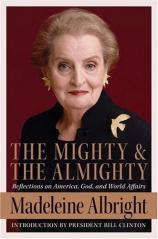The Mighty and the Almighty: Reflections on America, God, and World Affairs
Review
The Mighty and the Almighty: Reflections on America, God, and World Affairs
Madeleine Albright brings a wide-angle lens to her discussion of the place of religion in world affairs. Born into a Catholic family, she later became an Episcopalian, only to discover late in life that her family lineage was Jewish. Further, as Secretary of State she spent much time and energy dealing with highly flammable issues in the Muslim world.
This book is a kind of sequel and amplification to her 2003 memoir MADAME SECRETARY. Albright is very good at filling in the historical context of such matters as the Arab-Israeli conflict, the complex divisions between Shiite and Sunni Muslims, Turkey's slow but sure evolution toward democracy and the bewildering tribal politics that seems to stifle progressive impulses in Africa.
What she adds from her own perspective is the religious angle, and much of what she says amounts to obvious truths that no sensible person could disagree with: No nation should claim to be in sole and complete possession of God's will or the ultimate religious truth; diplomats should make themselves familiar with the language and religion of countries they are dealing with; diplomacy should never be a mere mask for religious proselytizing; the U.S. should remain strictly neutral toward the sectarian religious strife in Iraq.
She also ponders such questions as what exactly constitutes a "just" war (in her formulation, the Iraq war fails the test) and whether morality or simple self-interest is the better reason for resorting to force.
Beware, she tells us, of "faith-based strife." Her warnings about this echo to some extent what Eric Hoffer wrote over half a century ago in THE TRUE BELIEVER, his wise book about the danger of any and all brands of fanaticism.
It will be no surprise that Albright is harshly critical of George W. Bush. The decision to invade Iraq and its messy aftermath, she fears, may rank "among the worst foreign policy disasters in U.S. history." She faults Bush also for his triumphalist rhetoric and disregard of any advice that runs counter to his own ideas.
She is concerned that the Arab-Israeli peace process may be "truly dead" and that the escalating battles between Shiite and Sunni Muslims might actually result in a nuclear arms race between them. She makes a persuasive case for admitting Turkey to the European Union and sees a likelihood that Iran may become the dominant power in the Persian Gulf. Instead of facing off against Muslim nations, she says the U.S. should seek to understand them better and take advantage of the many things we have in common with them. She sees some hope in the Alexandria Declaration of 2002, which affirmed that peace cannot be achieved without "reconciliations between religions and cultures." She sums herself up as "an optimist who worries a lot."
This book was written with Bill Woodward, who also collaborated on MADAME SECRETARY. It comes across as earnest, thoughtful and well-intentioned. Inevitably there is a partisan slant to Albright's own views, but she draws on her own government service to back them up. She has been around, talked to all sorts of people whose views matter and thought deeply about what they told her.
As to how religion can help sort out all these dilemmas, she characteristically has no firm answer. As I read, I kept remembering what my good Catholic mother often said: "You know, organized religion has an awful lot to answer for."
Reviewed by Robert Finn on May 2, 2006
The Mighty and the Almighty: Reflections on America, God, and World Affairs
- Publication Date: May 1, 2006
- Genres: Current Affairs, Nonfiction
- Hardcover: 352 pages
- Publisher: HarperCollins
- ISBN-10: 0060892579
- ISBN-13: 9780060892579





